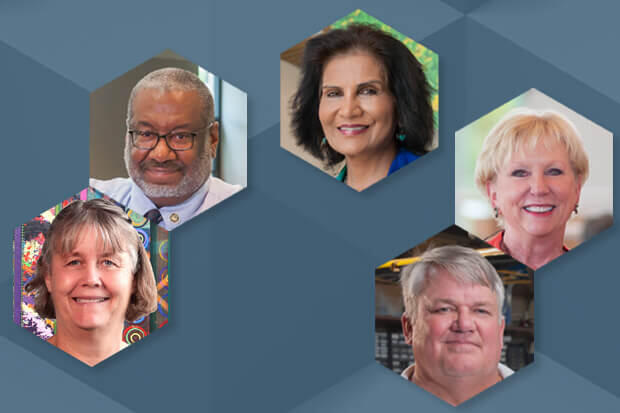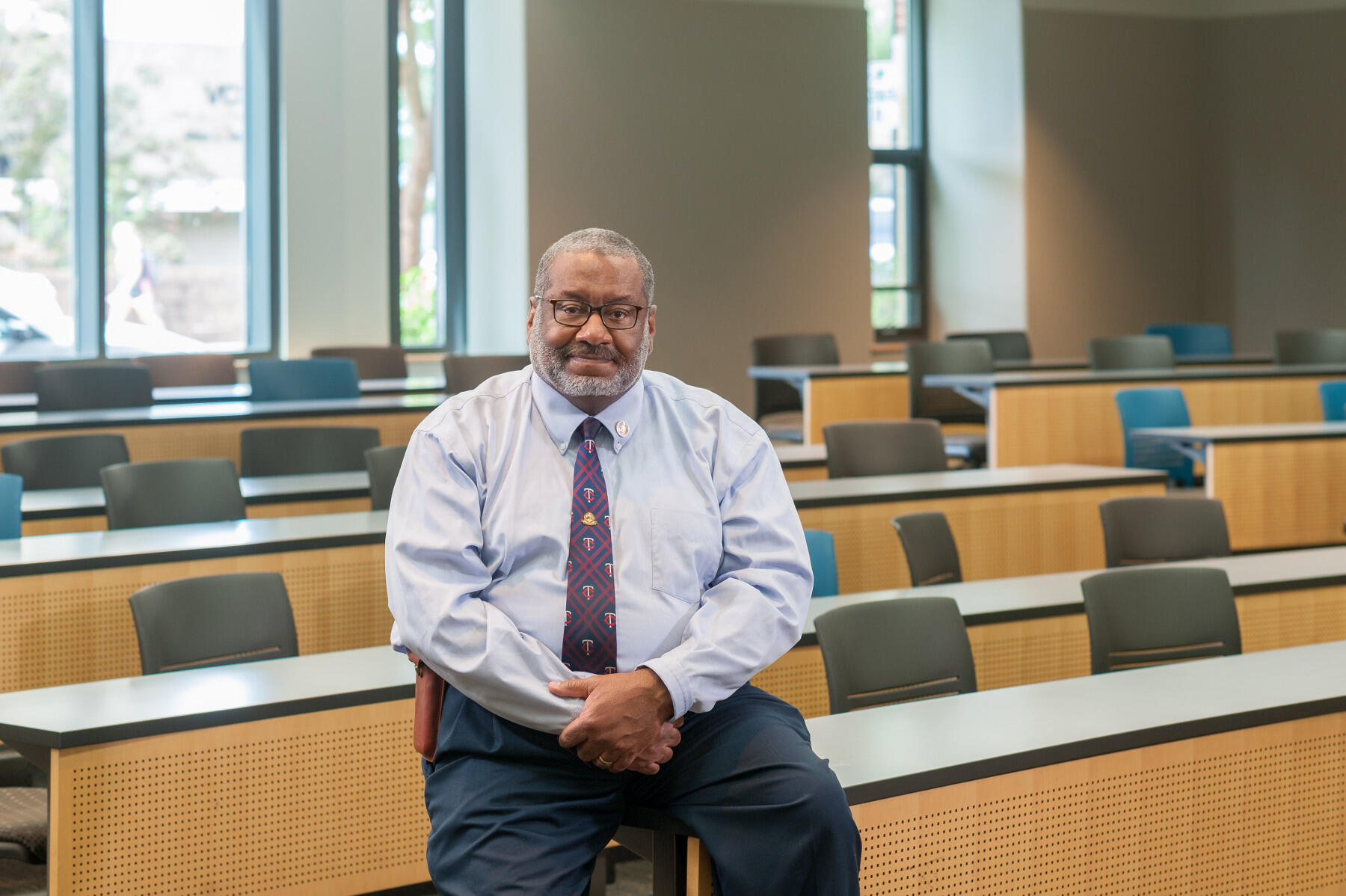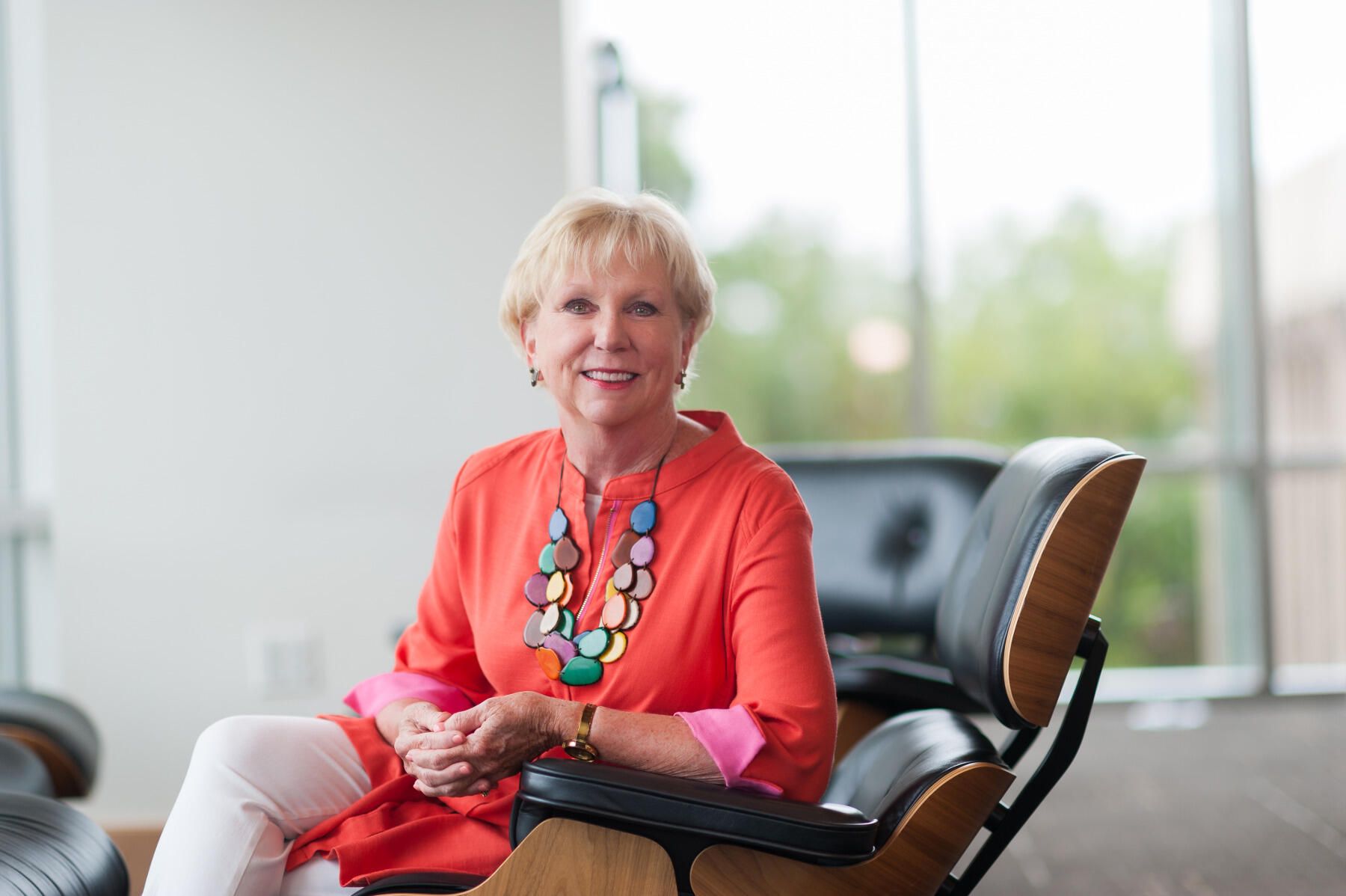
Aug. 3, 2018
Words from the wise: Five longtime professors reflect on their 20-plus years of teaching at VCU
Share this story
Have you ever taken a class with a professor who taught one of your parents? With more than 2,300 full-time faculty members at Virginia Commonwealth University, including many who have been here for several decades, that scenario does happen on occasion.
We asked five professors who have two decades or more of VCU teaching experience to share their experiences, favorite moments and lessons learned throughout the years.

Reni Gower, professor of painting and printmaking
School of the Arts
Years at VCU: 37
What do you like best about teaching at VCU? As cliché as it sounds, the students are the best thing about teaching at VCU. Being in the fine arts, I love learning what motivates a student and envisioning ways to make art about it. New students always renew my enthusiasm for the classroom.
How has VCU changed since you started working here?
When I first arrived, VCU was a fairly sleepy campus with many local students commuting from off campus. Now with a significantly higher enrollment, there is an active residential campus culture of enormous diversity.
Do you have a favorite classroom moment?
More of an outside of the classroom moment: I had a student making sculptural “paintings” out of found materials such as plastic, hair, nylon and wood. When he wanted to light the works on fire and document the burning process as a performance, I asked him to take the event outside. Given the volatile nature of his materials, I also required that he sign a waiver against future liability, that he would not do the performance alone and that he have a fire extinguisher handy at all times. In our follow-up critique, he presented a dramatic video along with the charred remains. Many years later, this same student — now an alumnus in New York City — sent me a retrospective catalog on Alberto Burri, an artist we had discussed, who also burned his work. His heartfelt inscription touched me deeply by noting my ongoing influence on his artmaking and how grateful he was for my support while he attended VCU.
What’s the best or most outrageous excuse you’ve gotten from a student for missing class or turning in a paper late?
Beyond the predictable (e.g., someone has died), students often claim:
- “I’m in my sister’s wedding.”
- “My parents booked my flight without asking me about finals.”
- “I have a court date.”
- “Burst pipes flooded my apartment and caused the heat to go out.”
- And always good for a 9 a.m. chuckle: “I am not a morning person.”
What have you learned from the students at VCU? Never underestimate them. They will rise to the highest bar you set.

Clarence Thomas, Ph.D., associate professor of mass communication
Richard T. Robertson School of Media and Culture
College of Humanities and Sciences
Years at VCU: 28
What do you like best about teaching at VCU?
I like the fact that I am teaching at my mother’s school. My mother, the late Mrs. Floretta Virginia Sears Thomas, graduated from the Saint Philip School of Nursing of the Medical College of Virginia in the 1940s. It was a segregated nursing school for black women in those days (now the VCU School of Nursing).
I also like the fact that VCU is a family school. My youngest child and many extended family members graduated from VCU.
What’s the best or most outrageous excuse you’ve gotten from a student for missing class or turning in a paper late?
I once had a student who described himself as “lazy” in an attempt to be excused.
What or who inspired you to teach?
I have always been around teachers. I come from a family of many teachers. I have at least four aunts who were public school teachers and many cousins who are teachers today.
How has changing technology shaped the way you teach?
During my early career, I worked in and taught television/radio production. The switch from analog to digital technology was and is revolutionary. Today, the average student has more creative power in their smart phone or laptop than a TV or radio studio had in the past. Therefore, it is easier to do more sophisticated work — media content — and do it faster.

Bela Sood, M.D., professor of psychiatry
School of Medicine
Years at VCU: 30
How has VCU changed since you started working here?
A lot of capital investment in architectural infrastructure and recently more support for faculty.
Do you have a favorite classroom moment?
Many, but those rare times when not one of the sleep-deprived residents goes to sleep in a lecture.
What or who inspired you to teach?
Being a teacher is the highest honor. In the East Indian tradition, the teacher or the “guru” is like an embodiment of God who transfers not only knowledge but wisdom to the student or the “shishya” thereby making the world a more enlightened place. That relationship is sacred. My mother was a professor and a role model for me.
How has changing technology shaped the way you teach?
Certainly, it has reduced visits to the Tompkins-McCaw Library! Knowledge is at our fingertips and leaves time to use in other productive ways. Students are able to access information. Teaching methods such as teleteaching allow you to expand your capabilities. In two weeks I teach a lecture on child mental health to students in seven Asian countries at 11 p.m.!
What’s your favorite class to teach and why?
Teaching about clinical syndromes is easy and traditional. I like teaching new topics integrating new experiences such as my work in policy and prevention. These new courses keep me current and translate my work into learning for students. When I hear myself in lectures it brings more clarity to my thinking as well and informs the quality of my work in the next iteration.

Daphne Rankin, Ph.D., associate vice provost for strategic enrollment management
Years at VCU: 29 (and two-time VCU alumna)
How has VCU changed since you started working here?
I came to VCU as a graduate student so I have watched the university change the landscape of Richmond dramatically over the past several decades. The university has much more of a “campus” feel than it did in the late 1970s. When I started graduate school, Park Avenue went straight through campus — where the Compass is now!
Do you have a favorite classroom moment?
Each summer during New Student Orientation I have the opportunity to present to the parents and family members in attendance. This summer, one of the mothers attending stopped me as we left the room and said that she recognized me when I began speaking and that she realized she and her boyfriend were students in my first Human Sexuality class. She went on to tell me that he proposed to her that semester, on Valentine’s Day, on the way to my class. They are still married and she was bringing their daughter to New Student Orientation!
What have you learned from the students at VCU?
Students often talk about what they’ve learned from professors — what they need to know is that their professors also learn from them. My students have shared their insights, their questions, their concerns and their celebrations with me, and I truly value what I have learned from them. Over the years, I’ve also learned a lot of slang terms in the Human Sexuality class that I’m sure I wouldn’t have heard anywhere else!
What’s your favorite class to teach and why?
In 1992, I designed a service-learning course entitled AIDS: Myths and Realities. The students in this class volunteered in the Richmond AIDS community and worked on a number of projects with Richmond-area AIDS service organizations. I taught this course for 10 years and found that every semester was different — the course evolved with the AIDS epidemic. The people that we met and the learning experiences my students and I had both in the classroom and in the community were life-changing for all of us.

Robert Klenke, Ph.D., professor of electrical and computer engineering
College of Engineering
Years at VCU: 19 (going on 20)
What do you like best about teaching at VCU?
I generally appreciate the fact that the majority of VCU students are hard workers who are eager to learn. I enjoy teaching them skills that they can use to join the electrical and computer engineering profession and solve real-world problems.
How has VCU changed since you started working here?
Our school has grown tremendously since I came here — which is why it’s now a “college.” When I started in the school, we had less than 20 faculty and staff, including the dean, and around 400 undergraduate students. Now we have well over 150 faculty and staff, over 1,700 undergraduate students and almost as many graduate students as we originally had undergraduates.
What’s the best or most outrageous excuse you’ve gotten from a student for missing class or turning in a paper late?
Probably getting arrested and/or having to be in court to miss a test — both of which I require third-party proof of before accepting.
What have you learned from the students at VCU?
Not to judge a book by its cover. Students who might not appear to be the most “notable” at first can turn out to be the best in the long run.
How has changing technology shaped the way you teach?
In engineering, the technology we actually teach to the students changes very rapidly and the rate of change does not seem to be slowing down. Thus it is critical for faculty in our profession(s) to pursue outside research, consulting and professional society involvement in order to keep up with the technology we need to teach our students about.
As far as teaching technology is concerned, that has not changed a great deal. We use white boards instead of chalk boards, we use the latest version of PowerPoint, and some multimedia, Blackboard for student communication, and the latest electronic design tools to build our designs, but the most learning still occurs when students go into a lab and actually build and test things.
Subscribe to VCU News
Subscribe to VCU News at newsletter.vcu.edu and receive a selection of stories, videos, photos, news clips and event listings in your inbox.









